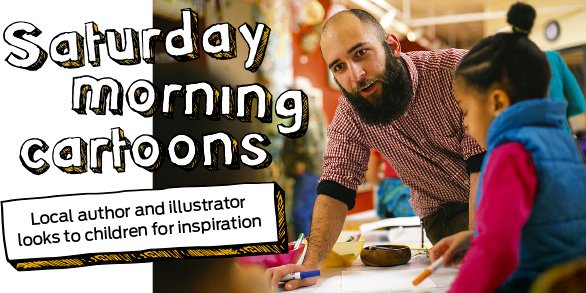- Home
- Visit
- Exhibits
- Programs & Events
- Membership
- Support
- About
- Checkout
- Cart
- Utility
- Birthday Party Cancellation Form
- JV Memory Book Submissions
- Phone Call
- Request for a Facility Rental Agreement
- Privacy Policy
- American Girl Benefit Sale
- Party Catering Form
- Event Date Request Form
- Camp Food Orders
- Flourish!
- IA24 Evening Event RSVP
- Development Events RSVP
- Development Tour
- Folder Request Form
- Development Team Test Page
- Logout
- Birthday Parties
Local author and illustrator looks to children for inspiration
Isthmus

PHOTO: BETH SKOGEN
Noah Phillips brings markers, paper and story prompts to the Madison Children’s Museum.
On any given Saturday, you can find Noah Phillips at the Madison Children’s Museum.
Well, he’s not exactly Noah Phillips. About once a week, the 22-year-old Washington, D.C., native and 2014 UW-Madison graduate becomes Philo A. Fflatus — a beleaguered, ink-splattered children’s author and illustrator suffering from a serious case of writer’s block.
Armed with little more than an easel, some paper and a few packs of markers and crayons, he sets up at a table on the museum’s second floor from 11 a.m. to 1 p.m. with hopes that young patrons will stop by and share their creative talents for writing and drawing.
He always has a handful of story prompts ready — this past week, it was monster ballerinas, an invisible town and a mysterious hole. He writes the titles in bold letters and waits patiently for someone to notice his plight.
Eight-year-old Claire Griffith approaches his table, curious.
“Can you help me with something?” Phillips asks her. “I’m writing a story, but I don’t know how it goes.”
Claire is enthusiastic about assisting, but her 9-year-old sister Maddie is a bit skeptical. But both girls brighten when Phillips tells them their work will be part of a real, illustrated storybook published by the Madison Children’s Museum.
“I really do get writer’s block, and the kids help me through it,” says Phillips, who is also an Isthmus contributor.
Before long, the girls have dreamed up a silly story about a hungry cat who gets outsmarted by a family of chipmunks. The narrative takes shape with gentle guidance from Phillips, who uses a series of questions designed to draw out details in the imagery and encourage a creative thought process.
“It’s not condescending, it’s not patronizing, it’s not contrived,” he says of the method. “I’m sincerely asking them for help. I think the kids love that.”
Upcoming book
Claire, Maddie and dozens of other Madison kids and parents have participated in Phillips’ Writer’s Block Workshops at the museum over the past several months, and soon, their work will be published in an anthology, The Three Chickens and Five Other Tales.
The stories are short and punchy and full of imaginative detail — the kind that can only come from the mind of a child. Phillips added his own ink and watercolor illustrations, and the result is an intentionally vintage-looking storybook that evokes comparison to Maurice Sendak and Quenten Blake.
“The kids are really excited to see their stories illustrated,” says Laurie Rossbach, the museum’s arts coordinator. “That’s one of the most fun parts about it — seeing Noah’s drawings bring their ideas to life.”
The book is the museum’s first foray into publishing, Rossbach says, and the project represents the museum’s desire to create more in-house content. Museum staff are still brainstorming, but possibilities include recipe books and art activity books featuring some of the projects that are popular in the museum’s art studio.
There’s no set publication date yet, but eventually the book will be available in the museum’s gift shop. Phillips hopes it will be the first in a series.
“Writer’s Block is a program that touches on so many different aspects of what we do here at the museum,” Rossbach says. “There’s literacy, storytelling, there’s an art angle ” we really love mixing things up like that.”
Divine inspiration
Phillips’ nom de plume has special significance — “Philo” is a prefix derived from the ancient Greek word philia, meaning love or affection. “A. Fflatus” comes from the Latin word afflatus, which is a kind of divine creative inspiration.
“[The name] means love of inspiration,” Phillips says. “That’s what I hope to cultivate and nurture.”
Though he’s been interested in drawing and writing since childhood, Phillips owes his inspiration for the Writer’s Block project to Lynda Barry, the award-winning cartoonist and assistant professor of interdisciplinary creativity at UW-Madison, who splits her teaching time between the Wisconsin Institute for Discovery and the art department.
In her own cartooning workshops, Barry uses the same technique of asking a series of guiding questions centered around one question: What is an image?
“I try to get my students to feel that writing and drawing aren’t any different,” Barry says. “It’s a certain state of mind. It’s not an art. It’s a way of talking or communicating.”
Phillips took Barry’s comics class last spring, and came to her for advice on a children’s illustrated chapter book he was working on as part of an independent study last fall. He had the characters developed and the plot mapped out, but every time he sat down to write the story, he couldn’t get anything done.
Barry’s suggestion? Ask the kids.
“Kids will help you out of any jam,” Barry says. “Any jam at all.”
Barry knows the positive effect that children’s natural creativity can have on adult projects. She’s even experimented with pairing 4-year-olds with Ph.D. students who are working on their dissertations. By collaborating with children and drawing abstract ideas from their research topic, the graduate students thought about the information in different ways.
“To me, [kids are] complex, organized beings with a very particular way of viewing the world,” Barry says. “They can really open your mind.”
– See more at: http://www.isthmus.com/arts/words/local-author-and-illustrator-looks-to-children-for-inspiration/#sthash.M7lnAipy.dpuf
